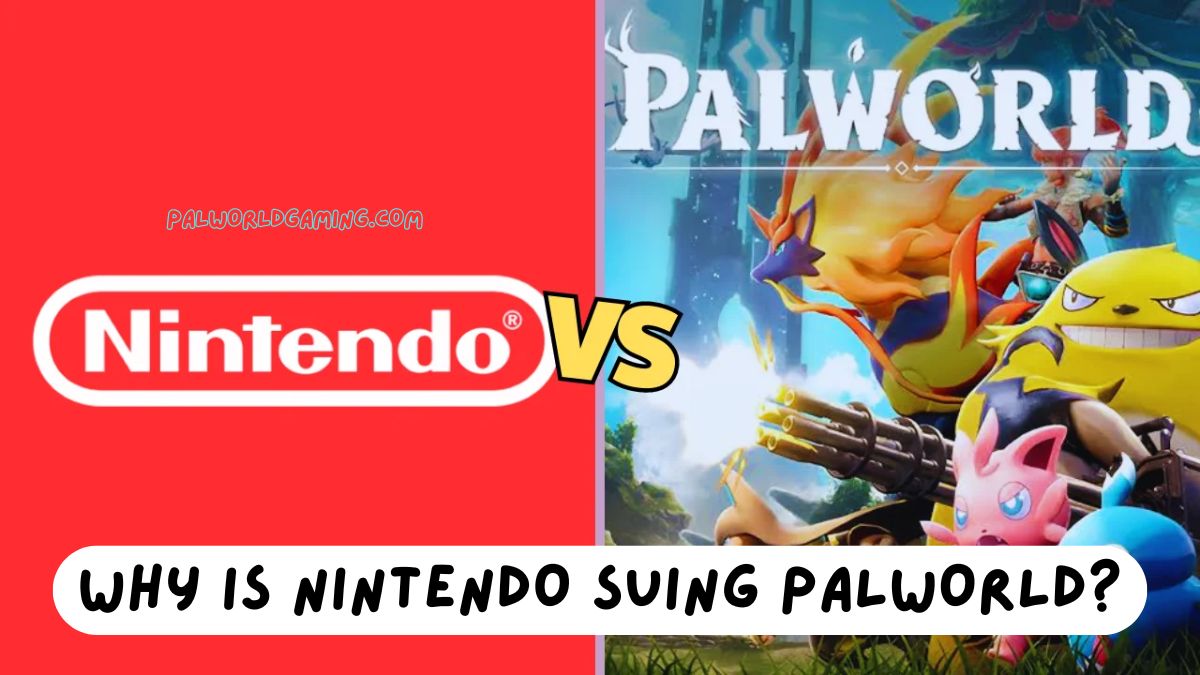Why Is Nintendo Suing Palworld? Nintendo’s recent lawsuit against Pocketpair, the developer of the game “Palworld,” has sparked significant interest and discussion within the gaming community. This legal action, which centers on allegations of patent infringement, highlights broader themes of intellectual property rights, innovation in gaming, and the implications for indie developers. This article delves into the details surrounding the lawsuit, its context, and its potential impact on the gaming arena.
Background on Palworld
“Palworld” is an open-world survival crafting game that allows players to capture and battle various creatures known as “Pals.” The game has gained popularity since its early access release in January 2024, selling over 10 million copies and achieving record concurrent player counts on Steam. Its unique blend of creature collection mechanics with gunplay has led to it being dubbed “Pokémon with guns” by fans, drawing comparisons to Nintendo’s iconic Pokémon franchise.The game’s success can be attributed to its engaging gameplay and the appeal of capturing and battling creatures, similar to what players experience in Pokémon games. However, this resemblance has also raised eyebrows and concerns from Nintendo and The Pokémon Company regarding potential infringement of their intellectual property.
The Lawsuit
On September 19, 2024, Nintendo and The Pokémon Company filed a patent infringement lawsuit against Pocketpair in the Tokyo District Court. The lawsuit alleges that Pocketpair has infringed upon several undisclosed patents held by Nintendo. While specific details about the patents in question have not been publicly disclosed, Nintendo’s legal action is notable for focusing on patent infringement rather than copyright violation.
Key Points of the Lawsuit
- Nature of Allegations: Nintendo’s decision to pursue a patent infringement case indicates that the company is focusing on gameplay mechanics rather than character designs or aesthetics. This approach suggests that Nintendo believes certain mechanics in “Palworld” may violate its existing patents related to game functionality.
- Confusion from Pocketpair: In response to the lawsuit, Pocketpair expressed confusion regarding the specific allegations. They stated that they were unaware of the particular patents they were accused of infringing upon and were currently investigating the claims. This lack of clarity raises questions about the communication between Nintendo and Pocketpair prior to the lawsuit.
- Nintendo’s History with IP Protection: Nintendo has a long-standing reputation for aggressively protecting its intellectual property rights. The company has previously taken legal action against various entities it perceives as infringing upon its brand or products. This lawsuit appears to be a continuation of that trend, particularly as “Palworld” gained traction in the gaming community.
- Potential Grounds for Infringement Claims: While specific details remain undisclosed, industry analysts speculate that Nintendo’s claims may relate to gameplay mechanics similar to those found in Pokémon games. For instance, “Palworld” features a mechanic where players must weaken a creature before capturing it using items akin to Pokéballs—referred to as “Pal Spheres” in the game. This resemblance could form a basis for Nintendo’s claims regarding patent infringement.
- Divisional Patents: Following “Palworld’s” release, Nintendo filed several divisional patent applications related to gameplay mechanics involving capturing creatures. Divisional patents break down existing patents into distinct components, allowing companies to protect various aspects of their inventions more effectively.
Implications for Indie Developers
The lawsuit against Pocketpair raises significant concerns about the impact of such legal actions on indie developers and innovation within the gaming industry:
- Chilling Effect on Creativity: Legal battles over intellectual property can create a chilling effect on creativity and innovation among smaller developers. Many indie studios may feel discouraged from exploring new ideas or mechanics if they fear potential legal repercussions from larger corporations like Nintendo.
- Resource Allocation: Pocketpair has publicly stated that they regret having to divert resources away from game development to address this lawsuit. Legal battles can be costly and time-consuming, potentially hindering a developer’s ability to focus on creating new content or improving their games.
- Broader Industry Concerns: The case highlights ongoing debates within the gaming industry regarding intellectual property laws and their implications for competition and creativity. Critics argue that overly aggressive enforcement of patents can stifle innovation and limit diversity in game design.
- Community Reaction: The gaming community has reacted strongly to news of the lawsuit, with many expressing concern over Nintendo’s approach to IP enforcement. Some fans argue that while protecting intellectual property is essential, aggressive litigation against smaller developers can harm the overall health of the gaming ecosystem.
Conclusion
Nintendo’s lawsuit against Pocketpair over “Palworld” underscores significant issues surrounding intellectual property rights in the gaming industry. As this case unfolds, it will be crucial for both parties to navigate these complex legal waters while considering the broader implications for innovation and creativity among indie developers.
The outcome of this lawsuit could set important precedents for how intellectual property laws are applied within gaming, potentially influencing future interactions between large corporations and smaller studios striving to carve out their niche in an increasingly competitive place. As discussions around this case continue, it remains essential for stakeholders across the industry to engage thoughtfully with these issues to foster a more inclusive and innovative gaming environment.
